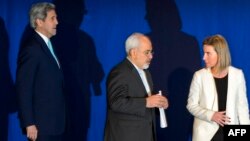Iran's Foreign Minister Mohammad Javad Zarif says international sanctions against Tehran will be lifted on January 16.
The International Atomic Energy Agency (IAEA) is expected to issue its final report confirming that Iran has complied with its commitments under the landmark nuclear deal reached between Iran and world powers last year.
The release of the report will trigger "Implementation Day" and the lifting of some U.S., United Nations, and European Union sanctions.
"Today with the release of the IAEA chief's report the nuclear deal will be implemented, after which a joint statement will be made to announce the beginning of the deal," Zarif was quoted as saying by state news agency IRNA.
Zarif is due to meet U.S. Secretary of State John Kerry, the EU's foreign policy chief Federica Mogherini, and IAEA chief Yukiya Amano later on January 16.
"Today is a good day for the people of Iran and the sanctions will be lifted today," Zarif told reporters in Vienna.
He added that it was also a "good day for the world" and "for the region."
Under the historic deal signed in July, Iran agreed to curb its nuclear program in exchange for the lifting of sanctions that have crippled its economy.
ALSO READ: Iran's Move To Add To Oil Glut Sends Global Markets Reeling
IAEA certification that Iran is honoring its obligations would trigger sanctions relief for Iran worth an estimated $100 billion.
The sanctions have cut off Iran from the global financial system, significantly reduced the exports of a major oil producer, and imposed economic hardship on ordinary Iranians.
The nuclear deal is opposed by all of the Republican candidates vying to succeed U.S. President Barack Obama in the presidential election in November. It is also viewed with deep suspicion by U.S. allies in the Middle East, including Israel and Saudi Arabia.
But the deal is supported by Washington's European allies, who joined Obama in tightening sanctions on Tehran as part of a joint strategy to force Iran to negotiate.









